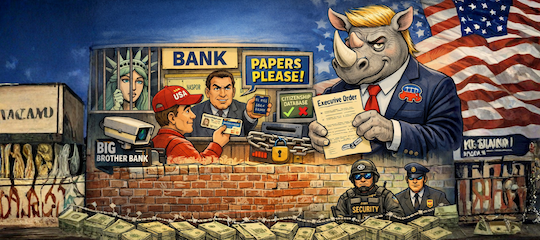Posted November 19, 2024
By Sean Ring
Trump’s Strange Brew
How is Donald Trump successfully mixing mercantilism and libertarianism?
We’ve been wrestling with this subject in editorial meetings, and I thought I’d take the time to write it out for all of us. After all, Sir Francis Bacon once said, “Reading makes a full man; conference a ready man; and writing an exact man.”
I’m unsure how exact I’ll get in this piece, so let’s start by defining the terms. Mercantilism and libertarianism are on opposite sides of the capitalist spectrum. (Some would call mercantilism “socialist,” but it only shares some socialist characteristics.) Then, we can contrast them. Finally, and most importantly, we can see how The Donald distilled them into his philosophy.
The Terms
In his Discourses, Epictetus claims Socrates said, “Education begins with the examination of terms.” Let’s define those terms.
Mercantilism dominated European thought from the 16th to the 18th centuries. It holds that a nation’s wealth and power are best enhanced by increasing exports and accumulating precious metals like gold and silver. Mercantilism emphasizes the state’s role in managing the economy so it achieves national prosperity and strengthens political and military power.
Mercantilism is collectivist, focusing on the nation-state's interests as a whole. It prioritizes national security, power, and wealth accumulation, even at the expense of individual freedoms or foreign nations. Mercantilism reflects a top-down, state-managed view of economic and political life.
This will sound familiar to anyone paying attention to Trump’s foreign policy.
On the other hand, libertarianism emphasizes individual liberty, limited government, and free markets. It advocates personal and economic freedoms and argues that individuals have the right to make their own choices as long as they don’t infringe on the rights of others. Libertarians prioritize minimizing the state's role in all aspects of life, from personal behavior to economic activity.
Libertarianism is individualistic, emphasizing personal freedom and autonomy. It sees economic freedom as inseparable from political freedom. Libertarianism opposes centralized control, arguing that decentralized decision-making leads to better outcomes.
Most importantly, in especially today’s context, libertarians are antiwar.
This should also sound familiar, especially concerning Trump’s domestic policy.
The Contrast
Let’s look at five ways these two philosophies oppose each other.
First, regarding the state’s role, strong intervention is a feature of mercantilism. Libertarians who want to remove “rulers” altogether (but not rules and laws) are called anarcho-capitalists. Libertarians who want to minimize governments are called minarchists.
Next, mercantilists see the economy as the field on which their country defeats the enemy. Economics is a zero-sum game for them. Libertarians believe the economic pie can get bigger and see the economy as a place where both parties mutually benefit from trade.
Speaking of trade, mercantilists advocate protectionist and regulated policies. Libertarians are free traders who desire open markets.
While mercantilists focus on national power and wealth, libertarianism’s goals are individual liberty and prosperity.
In short, mercantilism is nationalist and collectivist. Libertarianism is global and individulist.
It’s not that Trump has no philosophy. His philosophy is a Frankenstein’s Monster of these two philosophies. Moreover, he’s got very different parts of the political spectrum to back him into a blowout of an election.
The Donald’s Strange Brew
Donald Trump’s economic policies represent a unique blend of mercantilism and libertarianism, though the two philosophies are often at odds.
On the one hand, Trump’s "America First" agenda and protectionist trade policies reflect strong mercantilist tendencies. By proposing tariffs on Chinese imports and having already renegotiated trade deals like NAFTA into the USMCA, Trump prioritized reducing trade deficits and protecting domestic industries.
These policies align with mercantilist ideas of fostering a trade surplus and viewing the economy as a tool for national strength. Trump’s focus on reviving manufacturing, incentivizing companies to return production to the U.S., and favoring industries like steel and fossil fuels further illustrates his nationalist economic approach, which often involved direct state intervention in strategic sectors.
At the same time, Trump incorporated - and will incorporate - libertarian principles into his policies, particularly in deregulation and taxation. His first administration aggressively rolled back environmental regulations and restrictions on industries such as energy and finance to reduce government interference in the economy. This hands-off approach aligns with libertarian free-market beliefs and minimal state involvement.
Similarly, the Tax Cuts and Jobs Act of 2017 significantly reduced corporate tax rates. It reflects libertarian values of allowing individuals and businesses to retain more of their earnings and reducing the government’s economic footprint. Trump's anti-bureaucracy rhetoric and emphasis on individual entrepreneurial freedom echo libertarian ideals.
This combination of philosophies creates a pragmatic and populist synthesis tailored to appeal to diverse voter groups. His mercantilist policies resonate with blue-collar workers and industries impacted by globalization, while his libertarian-leaning tax cuts and deregulation appeal to business owners and wealthier constituents.
However, the blend has contradictions. Libertarians often criticize Trump’s tariffs and protectionist policies as harmful to free trade. At the same time, those aligned with mercantilist ideals view his deregulatory measures as undermining the state’s ability to manage the economy strategically.
His nominations foster even more confusion. Robert F. Kennedy, Jr., will undoubtedly take a hacksaw to the Department of Health and Human Services. But that’s only to get the FDA to stop making such bad decisions about our health. Tulsi Gabbard will surely cut the number of clearances to the private sector, hurting those consultancies. Pete Hegseth will do everything he can to stop the grift in the Pentagon. And Matt Gaetz, as the presumptive AG, once said that Alcohol, Tobacco, and Firearms should be the name of a store, not a government department.
And yet, Marco Rubio at the State Department and Elise Stefanik at the UN will presumably and happily (as neocon hawks) project American power.
Ultimately, Trump’s approach reflects a selective integration of mercantilism and libertarianism, driven more by political strategy and populist appeal than strict ideological consistency.
Wrap Up
I want you to understand where I’m coming from. I’m not so much thrilled as relieved The Donald is back in. The country was on the wrong track, and having the Cackling Hyena succeed her braindead boss would have been catastrophic.
But it’s not all unicorns and rainbows going forward. Trump has to clean up Biden’s messes domestically (inflation) and abroad (Ukraine and Israel). He’s got to walk a fine line between stimulus and restraint.
But I’ll always think having a patriot behind the Resolute Desk is better than having someone give away the game to the other teams. Trump’s heart is in the right place. But he must do a better job of getting the right people in the right place to implement his policies rather than having the enemy inside the gates trying to thwart his every move.
The President of the United States is a civilian in command. His orders are to be carried out. He’s one to be obeyed, not controlled. His underlings must understand and accept that.
And then we’ll see if The Donald’s Strange Brew of Mercantilism and Libertarianism is the right elixir for a country crying out for medicine.

The Biggest RINO of Them All
Posted February 27, 2026
By Sean Ring

Sports, Predictions, and Morons
Posted February 26, 2026
By Sean Ring

SOTU or STFU?
Posted February 25, 2026
By Sean Ring

Building an AI-Proof Portfolio
Posted February 24, 2026
By Sean Ring

Beware of Flying Turkeys
Posted February 23, 2026
By Matt Badiali

